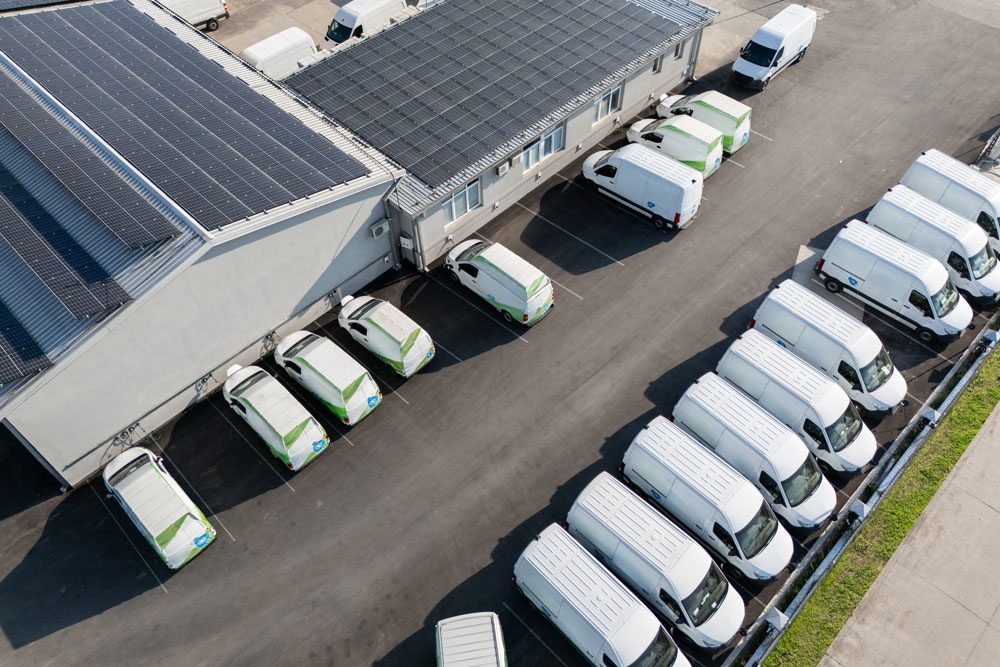Insight into the Depot Charging Scheme

The UK government’s £30 million Depot Charging Scheme offers fleet operators grants of up to £1 million to cover the cost of installing depot-based electric vehicle charging infrastructure. With the application window closing at the end of November, fleets are urged to act quickly to take advantage of this scheme
Fleet managers across the UK are being urged to take advantage of the government’s new Depot Charging Scheme, a multi-million-pound initiative aimed at accelerating the electrification of vans, HGVs and coaches.
With up to £1 million in grant funding available per organisation, the scheme significantly reduces the cost burden of installing depot-based charging infrastructure, which is often cited as one of the biggest barriers to transitioning to electric fleets.
The scheme allows organisations to claim up to 75 per cent of eligible infrastructure costs, including chargepoints and all associated civil and electrical engineering works. There’s no limit to the number of depot locations you can apply for, but each organisation may submit only one application for funding.
The scheme is open to public and private sector fleets, including local authorities and non-profits, and is available across England, Scotland, Wales and Northern Ireland. To qualify, applicants must own or have landlord permission for the depot site and either own, lease or have ordered at least one battery electric van, coach or HGV. Importantly, the funding can be used for any type or speed of chargepoint, provided it meets the operational needs of the fleet. However, upgrades to grid connections fall outside the scope of eligible costs.
Applications are open now and will close on 28 November 2025, or earlier if the £30 million funding pot is fully allocated. All funded works must be completed no later than 31 March 2026.
The application process
The two-stage application process is designed to ensure that funding is directed toward well-planned and deliverable projects. Initially, applicants will need to outline their business profile, fleet composition, infrastructure requirements, and indicative project costs. Those meeting the eligibility criteria will then be invited to a more detailed second stage, requiring full delivery plans, permission documentation, and budget breakdowns. If unsuccessful at this stage, applicants may appeal and, at the Department’s discretion, revise and resubmit their plans.
Support for applicants is being provided by Cenex, in partnership with Energy Saving Trust, who are offering technical advice to guide fleets through the complexities of charging infrastructure installation. Chris Rimmer of Cenex highlighted the critical importance of depot-based infrastructure in enabling the shift to electric HGVs and coaches, describing it as “the next big challenge for transport decarbonisation.”
Nick Harvey from Energy Saving Trust echoed this sentiment, emphasising that the scheme addresses a key obstacle: the high upfront cost of infrastructure. “We’re proud to partner with Cenex to provide the expert guidance businesses need to reduce their emissions and lower running costs by making a confident switch to electric vehicles,” he said.
A welcome step
The Society of Motor Manufacturers and Traders (SMMT) also welcomed the scheme, with commercial vehicle section manager Will Reeves describing it as a “welcome step to accelerate zero emission uptake.” However, he warned that grid connection delays remain a major bottleneck, particularly for HGV operators. Some are facing wait times of up to 14 years for upgrades, prompting SMMT to call on the government to prioritise planning approvals for depots in the same way as data centres and solar farms.
Michael Braybrook, managing director at Zaptec UK, said: “The Depot Charging Scheme is a major opportunity for fleet charging. Missing the November deadline could mean paying more to catch up later – so we encourage all operators who can to apply now. It is also important to consider the other funding for EV infrastructure that have a deadline in March 2026.
“Fleet depots are transforming rapidly. Those who act now can take advantage of government support and leap ahead, giving them a commercial advantage and helping to deliver net zero goals.”
Grants for vehicles
The government has also extended its Plug-in Van and Truck Grant scheme to at least 2027.
Currently, the grant offers up to £2,500 for small vans, £5,000 for large vans, £16,000 for small trucks, and £25,000 for large trucks. While the precise funding levels for the 2026–2027 financial year have not yet been announced, the extension alone has been welcomed across the commercial transport sector.
For fleet managers weighing the switch to electric, the Depot Charging Scheme presents a rare opportunity to offset infrastructure costs while future-proofing operations. With funding limited and the application window now open, those ready to invest in the future of zero-emission transport should act quickly.
More information, including the eligibility criteria and how to begin your application, is available through the application portal.






